Category:Child Jesus--cinema (subject)
Works of cinema related to Child Jesus.
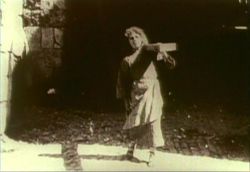

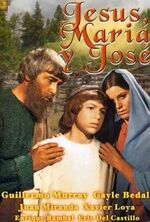

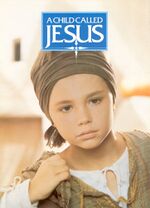
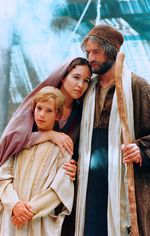
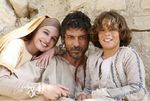

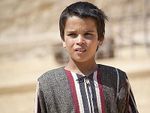
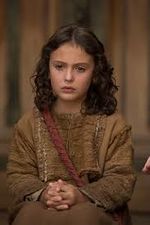
Overview
Only a limited number of Jesus movies showed interest in the Childhood of Jesus, rather focusing of his Nativity, Miracles, and Passion.
The first movie on the Life of Jesus, La vie et la passion de Jésus-Christ (1903), devoted to the Childhood of Jesus two scenes, which were quite different in tone. "The Holy Family at Nazareth" offered a quite "realistic" picture of Jesus working with his father, while "Jesus among the Doctors" was more formal and stereotyped in its presentation of the "canonical" subject. See YouTube.
The realistic path was followed by the "Protestant" From the Manger to the Cross (1912 Olcott), feature film. An experienced child actor, Percy Dyer, was hired to play the part and the film was shot on locations, in Palestine and Egypt. Olcott drew inspiration from the work of James Tissot and the few silent scenes involving Child Jesus were a reenactment of some of Tissot's most famous paintings; cf. Life of Jesus (1894 Tissot), art. See YouTube.
The influence of James Tissot is noticeable also in Christus (1916 Antamoro), feature film. The "Catholic" movie, also shot "on locations," offered however a quite stereotyped picture of Jesus as a child modeled on his adult life. The theological concern was to stress that Jesus had since his childhood a clear self-consciousness of his messianic role, to the point that Child Jesus (featured by Renato Visca) is shown constantly followed by a group of children "disciples," whom he leads, and preached to, with authority. See YouTube.
In 1972 Jesús, María y José (1972 Zacarías), film was the first movie entirely to focus on the childhood of Jesus at Nazareth and speculate on his whereabouts as a boy. The Mexican movie was traditional in its approach to the subject; the father of Jesus, Joseph of Nazareth, was portrayed as an old man acting as a guardian or grandfather of Jesus. Yet the script had necessarily to create an original narrative, besides the Lukean episode of Jesus among the Doctors, so inaugurating a new genre that would be soon followed by other movies.
In Jesus of Nazareth (1977 Zeffirelli), film, the TV miniseries format gave the opportunity to elaborate on Jesus' childhood, devoting two major scenes to the subject. Child actor Lorenzo Monet was chosen for his blond hair and distinctive blue eyes. Filmmaker Franco Zeffirelli's goal was to create a sharp contrast between Jesus' appearance, on one hand, and on the other, the "normality" of his family (Joseph now had the age and behavior of a real father) and the very realistic Jewish setting in which Jesus lived. The contrast reminded the viewers that Jesus, although living in this world, did not really belong to it but came from "elsewhere." The setting of the first scene is the synagogue of Nazareth. Zeffirelli insisted in having Young Jesus perform a Bar Mitzvah ceremony, even though consultant Rabbi Albert Friedlander reminded him that such ceremonies were practiced only from the 15th century. Friedlander tried to teach Lorenzo Monet to read a short portion of the Pentateuch in Hebrew, though he mumbled it and the director was not satisfied (eventually the reading was done mostly in English). The ceremony is interrupted by the arrival of Roman soldiers, which allows the filmmaker to stress the reality of Roman occupation and the violent opposition of the Zealots. The second scene illustrates the "biblical" episode of Jesus among the Doctors in the Temple of Jerusalem.
Another successful TV miniseries, Un bambino di nome Gesù (A Child Called Jesus / 1987 Rossi), TV mini-series, focused in 1987 entirely on the childhood of Jesus at the time of the stay of the Holy Family in Egypt until their return to Nazareth. Joseph was still older than Mary but like in Zeffirelli, was a mature man in the fullness of his strength. The plot was only vaguely related to the Gospel of Matthew. As a boy Jesus had to escape a murder attempt by Herod Archelaus and grew up more and more conscious of his destiny.
Jesus movies continued occasionally to include a few scenes on Young Jesus, most notably, Jesus (1979 Sykes, Krisch), film (following the Gospel of Luke). The Son of Man (2005 Dornford-May), film and Color of the Cross (2006 LaMarre), film offered the first portrays of Jesus as a black child.
In 2006 a third movies appeared to focus entirely on the childhood of Jesus, after Jesús, María y José (1972 Zacarías), film and Un bambino di nome Gesù (A Child Called Jesus / 1987 Rossi), TV mini-series. In La sacra famiglia (2006 Mertes), film, Joseph was a widower and father of three sons, who struggled to understand the true identity of the new child, born from his virgin wife. The movie followed the canonical gospels in the description of the events of the nativity of Jesus, and apocryphal narratives related to his childhood. As Young Jesus began manifesting his healing powers, suspicious and fear spread among his own relatives and neighbors.
While following the traditional narrative, Io sono con te (Let It Be / 2010 Chiesa), feature film shifted the emphasis on the anti-conformist education Jesus received from his high-spirited and independent mother, who taught his son to ask questions and challenge the tradition.
In The Young Messiah (2016 Nowrasteh), feature film, Adam Greaves-Neal is a seven-year-old Jesus, who tries to discover the truth about his life when he returns to Nazareth from Egypt. He gradually realizes that he is the Son of God, sent by God, to be the savior of humanity.
@2014 Gabriele Boccaccini, University of Michigan
The films and their interpreters
| 1890s | Child Jesus | Film | Country |
|---|---|---|---|
| 1898 | (uncredited) | La vie et la passion de Jésus-Christ (The Life and Passion of Jesus Christ / 1903 Zecca, Nonguet), feature film |
| 1910s | Child Jesus | Film | Country |
|---|---|---|---|
| 1912 | Percy Dyer (age 12) / George Hollister Jr. (age 4) | From the Manger to the Cross (1912 Olcott), film | |
| 1914 | Gabriel Briand | # Life of Our Saviour (1914) | |
| 1916 | Renato Visca (age 12) | Christus (1916 Antamoro), feature film | |
| 1918 | Harold Quintin Driscoll | Restitution (1918 Gaye), feature film |
| 1910s | Child Jesus | Film | Country |
|---|---|---|---|
| 1956 | [[ ]] | Jesus of Nazareth (1956 BBC), TV mini-series |
| 1980s | Child Jesus | Film | Country |
|---|---|---|---|
| 1987 | Matteo Bellina (age 8) | Un bambino di nome Gesù (A Child Called Jesus / 1987 Rossi), TV mini-series | |
| 1987 | (uncredited) | Marie de Nazareth (Mary of Nazareth / 1995 Delannoy), film |
Percy Dyer (1912)
Renato Visca (1916)
David Bravo (1972)
Lorenzo Monet (1977)
Matteo Bellina (1987)
Gianmarco Giovi (2000)
Brando Pacitto (2006)
Alex Collins (2006)
Mohamed Idoudi (2010)
Adam Greaves-Neal (2016)
Pages in category "Child Jesus--cinema (subject)"
The following 10 pages are in this category, out of 10 total.
1
- La vie et la passion de Jésus-Christ (The Life and Passion of Jesus Christ / 1903 Zecca, Nonguet), feature film
- Restitution (1918 Gaye), feature film
- La Passion (The Life of Our Saviour; or, The Passion Play / 1914 Maître), feature film
- Jesus of Nazareth (1956 BBC), TV mini-series
- Gospel Road (1973 Elfstrom & Cash), film
2
- Maria, figlia del suo figlio (Maria: Daughter of Her Son / 2000 Costa), TV film
- The Miracle Maker (2000 Hayes, Sokolov), animated feature film
- Maria, Mãe do Filho de Deus (Mary, Mother of the Son of God / 2003 Góes), feature film
- Jesus: The Desire of Ages (2014 Hamilton-Myers, Orozco), feature film
- Joseph and Mary (2016 Christian), feature film
Media in category "Child Jesus--cinema (subject)"
The following 8 files are in this category, out of 8 total.
- 1912 Olcott (film).jpg 300 × 460; 49 KB
- 1916 Antamoro (film).jpg 1,382 × 1,761; 278 KB
- 1923 Wiene (film).jpg 300 × 426; 25 KB
- 1971 Regattieri (film).jpg 282 × 400; 25 KB
- 1987 Rossi (TV miniseries).jpg 200 × 280; 19 KB
- 2010 Chiesa (film).jpg 472 × 669; 146 KB
- 2015 Menaul (TV miniseries).jpg 214 × 317; 20 KB
- 2016 Nowrasteh (film).jpg 214 × 317; 14 KB



















